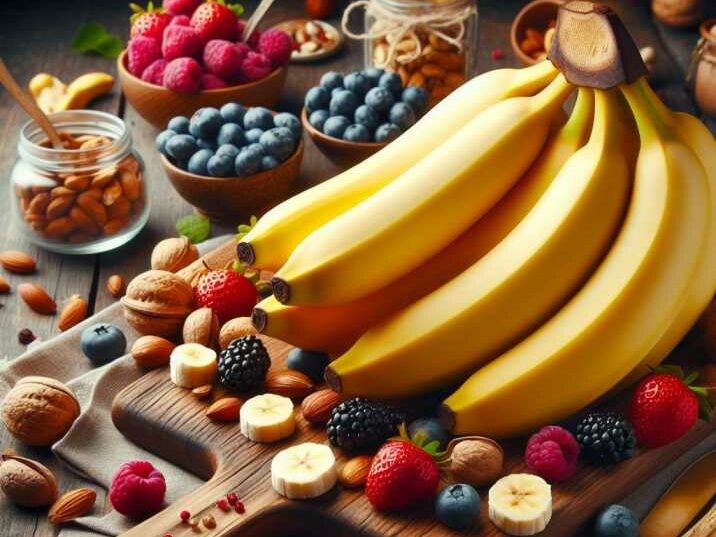Introduction:
Table of Contents
Have you ever wondered about the nutritional value of those bright yellow Cavendish bananas that you enjoy as a snack or add to your morning cereal? Understanding the calorie count and macronutrient breakdown of these popular fruits can help you make informed choices about your diet. Let’s delve into the details to uncover the typical calorie count and macronutrient breakdown of Cavendish bananas.

What is the Typical Calorie Count of Cavendish Bananas?
Cavendish bananas are known for their sweet taste and creamy texture, but they are also relatively low in calories. On average, a medium-sized Cavendish banana contains around 105 calories. This makes them a convenient and satisfying snack option for anyone watching their calorie intake.
Calorie Count and Macronutrient Breakdown of Cavendish Bananas:
Cavendish bananas are not only delicious but also packed with essential nutrients. Here’s a breakdown of the macronutrients found in a medium-sized Cavendish banana:
- Carbohydrates: The majority of the calories in Cavendish bananas come from carbohydrates, particularly natural sugars like glucose, fructose, and sucrose. A medium-sized Cavendish banana typically contains about 27 grams of carbohydrates, making it a quick source of energy.
- Protein: While bananas are not particularly high in protein compared to other foods, they still contain a small amount. A medium-sized Cavendish banana typically provides around 1 gram of protein.
- Fat: Bananas are naturally low in fat, with less than 0.5 grams of fat per medium-sized fruit. This makes them a great option for those looking to reduce their fat intake.
Why Are Cavendish Bananas a Nutritious Choice?
Despite their relatively low calorie count, Cavendish bananas are packed with essential nutrients that offer numerous health benefits. Some reasons why Cavendish bananas are a nutritious choice include:
- Rich in Potassium: Bananas are well-known for their high potassium content, which plays a crucial role in maintaining heart health and regulating blood pressure.
- Good Source of Fiber: Cavendish bananas are a good source of dietary fiber, which promotes digestive health and helps you feel full and satisfied.
- Vitamins and Minerals: Bananas are also rich in vitamins and minerals such as vitamin C, vitamin B6, and manganese, which support overall health and well-being.
Table summarizing the information about Cavendish bananas:
| Nutrient | Amount per Medium-Sized Cavendish Banana |
|---|---|
| Calories | 105 |
| Carbohydrates | 27 grams |
| Protein | 1 gram |
| Fat | Less than 0.5 grams |
| Potassium | Approx. 422 mg |
| Fiber | Approx. 3 grams |
| Vitamin C | Approx. 10 mg |
| Vitamin B6 | Approx. 0.5 mg |
| Manganese | Approx. 0.3 mg |
This table provides a clear breakdown of the calorie count and macronutrient content of Cavendish bananas, along with key vitamins and minerals they contain.
Conclusion:
Next time you reach for a snack, consider grabbing a Cavendish banana. With their low calorie count, delicious taste, and impressive nutritional profile, Cavendish bananas are a smart choice for anyone looking to maintain a healthy diet. Incorporate these nutritious fruits into your daily routine and enjoy the many benefits they have to offer.
FAQs (Frequently Asked Questions):
- Q: Are Cavendish bananas high in calories? A: No, Cavendish bananas are relatively low in calories, with around 105 calories in a medium-sized fruit.
- Q: What are the main macronutrients found in Cavendish bananas? A: The main macronutrients in Cavendish bananas are carbohydrates, primarily in the form of natural sugars, along with a small amount of protein and almost no fat.
- Q: What makes Cavendish bananas a nutritious choice? A: Cavendish bananas are rich in potassium, fiber, vitamins, and minerals, offering various health benefits such as improved heart health and digestion.
- Q: Can Cavendish bananas help with weight management? A: Yes, Cavendish bananas can be a helpful component of a weight management plan due to their low calorie count and satisfying fiber content.
- Q: How should Cavendish bananas be stored to maintain their freshness? A: Cavendish bananas should be stored at room temperature until ripe, then refrigerated to slow down the ripening process and extend freshness.
